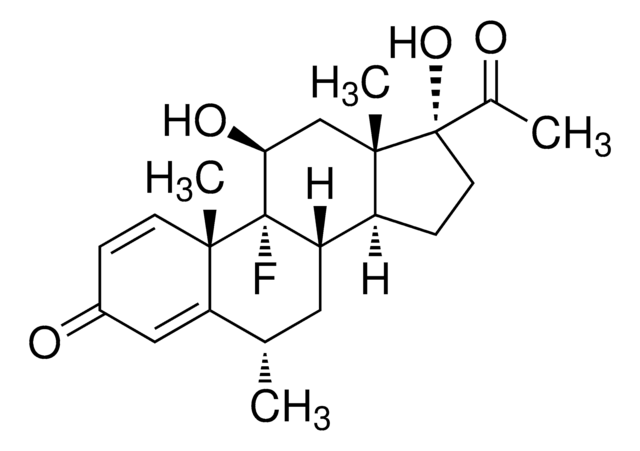Wichtige Dokumente
F9381
Fluormetholon
≥98%
Synonym(e):
11β,17α-Dihydroxy-9-fluoro-6-methyl-1,4-pregnadiene-3,20-dione
About This Item
Empfohlene Produkte
Qualitätsniveau
Assay
≥98%
SMILES String
C[C@H]1C[C@H]2[C@@H]3CC[C@](O)(C(C)=O)[C@@]3(C)C[C@H](O)[C@]2(F)[C@@]4(C)C=CC(=O)C=C14
InChI
1S/C22H29FO4/c1-12-9-17-15-6-8-21(27,13(2)24)20(15,4)11-18(26)22(17,23)19(3)7-5-14(25)10-16(12)19/h5,7,10,12,15,17-18,26-27H,6,8-9,11H2,1-4H3/t12-,15-,17-,18-,19-,20-,21-,22-/m0/s1
InChIKey
FAOZLTXFLGPHNG-KNAQIMQKSA-N
Angaben zum Gen
human ... NR3C1(2908)
Suchen Sie nach ähnlichen Produkten? Aufrufen Leitfaden zum Produktvergleich
Anwendung
- Topical fluorometholone treatment and desiccating stress change inflammatory protein expression in tears.: This research explores the changes in tear protein expression due to topical fluorometholone and environmental stress, offering insights into ocular surface inflammatory responses (Nättinen et al., 2018).
- General Pharmacokinetic Model for Topically Administered Ocular Drug Dosage Forms.: This study provides a pharmacokinetic model applicable to topical ocular medications, including fluorometholone, enhancing understanding of drug dynamics in eye treatments (Deng et al., 2016).
Biochem./physiol. Wirkung
Signalwort
Warning
H-Sätze
Gefahreneinstufungen
Acute Tox. 4 Dermal - Acute Tox. 4 Inhalation - Acute Tox. 4 Oral
Lagerklassenschlüssel
11 - Combustible Solids
WGK
WGK 3
Flammpunkt (°F)
Not applicable
Flammpunkt (°C)
Not applicable
Persönliche Schutzausrüstung
dust mask type N95 (US), Eyeshields, Gloves
Analysenzertifikate (COA)
Suchen Sie nach Analysenzertifikate (COA), indem Sie die Lot-/Chargennummer des Produkts eingeben. Lot- und Chargennummern sind auf dem Produktetikett hinter den Wörtern ‘Lot’ oder ‘Batch’ (Lot oder Charge) zu finden.
Besitzen Sie dieses Produkt bereits?
In der Dokumentenbibliothek finden Sie die Dokumentation zu den Produkten, die Sie kürzlich erworben haben.
Kunden haben sich ebenfalls angesehen
Unser Team von Wissenschaftlern verfügt über Erfahrung in allen Forschungsbereichen einschließlich Life Science, Materialwissenschaften, chemischer Synthese, Chromatographie, Analytik und vielen mehr..
Setzen Sie sich mit dem technischen Dienst in Verbindung.















